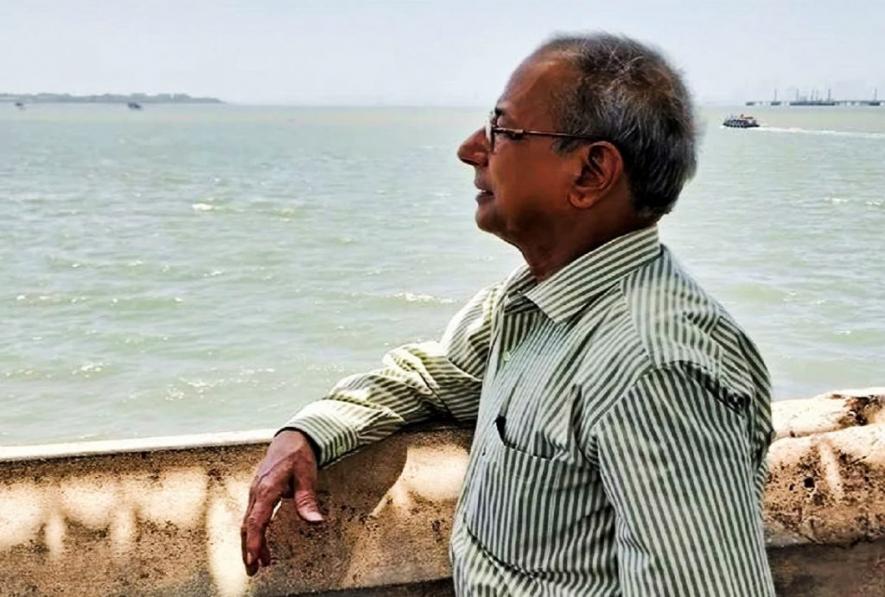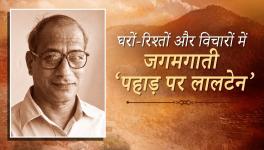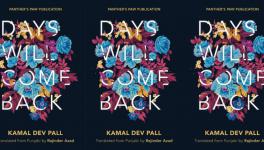One By One They Go: A Tribute to Manglesh Dabral

Those who cannot see
Cannot make out their way
Those who are crippled
Cannot reach anywhere
Those who are deaf
Cannot listen to life’s footfalls
The homeless don’t build a home
Those who are mad
Wouldn’t know what they want
These are such times
When anybody can turn blind crippled
Deaf homeless mad
-Wrote Manglesh Dabral in one of his most recent poems (These Times) included in the global anthology of poems about these dark times “Singing in the Dark”, edited by me with Nishi Chawla (Penguin, October 2020).
It was with intense grief that I heard that he had fallen victim to the pandemic and had been following friends’ posts on the Facebook and calling up common friends to know how he, ever a fighter, is coping with it. His plight got worse day by day and finally he succumbed to the demonic power of the unpredictable illness that literally broke his heart and figuratively broke that of many who loved and admired him as a great human being who combined innocence and straight-forwardness with political intelligence and fortitude, a committed journalist who worked with Patriot (Hindi), Pratipaksh, Aaspaas, Poorvagrah, Amrit Prabhat, Jansatta and Sahara Samay and Public Agenda, and above all, a distinguished Indian poet with an unmistakable voice of his own.
I had begun reading Manglesh’s poems much before I met him first at Bharat Bhavan , Bhopal in its glorious days under the leadership of Ashok Vajpeyi. Probably he had published only his first two books at that time, Pahar par Lalten ( The Lantern on the Mountain) and Ghar ka Rasta ( The Way Home). His poems frequently went back to his childhood in Tehri Garhwal and his days as a student in Dehradun and he considered himself an offspring of the mountains.
The first collections, from which I had done my first translations of his poems as far back as the 1980s as a part of my anthology of contemporary Hindi poetry in Malayalam, were followed by Hum jo Dekhte Hein (We who Look on), Awaz bhi ek Jagah Hein (Voice is a Place too) and Naya Yug mein Shatru (Enemy in the New Age). He also wrote excellent prose in Hindi as proved by his book on his life in Iowa as a Resident Fellow (Ek bar Iowa: Iowa for once) , and his books on writers’ material existence (Lekhak ki Roti– The Writer’s Bread) and spiritual existence (Kavi ka Akelaapan – The Poet’s Solitude).
I remember with a lot of love and pain my many travels with him for poetry festivals and book fairs, including our train journey from Frankfurt to Dresden and our last flight together to the “Chair Poetry Evenings” in Kolkata, our conversations that these days would inevitably veer towards the political situation the country, our little private jokes and the inevitable exchange of our newest poems.
Manglesh Dabral belonged, in Hindi poetry, to the generation of politically conscious and aesthetically excellent poets that follows Raghuvir Sahay, Shamsher Bahadur Singh, Kedarnath Singh, Kunwar Narain and Vinod Kumar Shukla. His poems had always held a special fascination for me. Look at a poem like “City” that echoes the dilemma of many of us who leave our village homes and come to the city and are seldom able to return:
I looked at the city
and smiled
and walked in
Who would ever want to live here
I wondered
And never went back.
In another poem he says, “The leaves that settle on my face/ fall from my childhood’s trees./ A lake sends me its waves, and,/ Like a wave, the night quivers. I walk/ On it, the death of leaves on my face.” Several poems like “Good for a Lifetime” (“Perhaps there was a bit of moisture there/ of a pastel shade/ Perhaps a shiver, perhaps hope”) , “The Quiet House” (“I am half-awake, half asleep/ Half asleep, half awake / Listening to sounds outside / No sobbing in them / No threats being made/ or fear expressed/ Nobody praying, nobody asking for alms…I ask nothing of the world/ and can live as squirrels do/ As grass does or a ball/ that a small jolt will bring/ this quiet house down/Doesn’t worry me.”) and “The Poem of Dreams” (There is no running away from dreams; they happen as a/consequence of waking. They tell us what we were and/ what we shall become’) stand out among his early works. Another early poem I cherish is “Grandfather’s Photograph” which ends,
‘I didn’t grow as tall as Grandfather
not as composed or as serious
Still something in me resembles him
An anger like his,
an ordinariness
I took walk with my head bent down
and everyday see myself
sitting in an empty
picture frame’
Dreams and memories were the very stuff of Manglesh’s early poems, and some of them continue to haunt his later works too though they seem closer to the reality, personal as well as political.
The first collection of the English translations of his poems, This Number Does Not Exist, Selected Poems 1981-2013 was brought out by Poetrywala, Mumbai in 2014 though many of his translations in English had appeared in collections like “Survival” (Sahitya Akademi) “Signatures” (National Book Trust) and “Gestures” (Sahitya Akademi) -the last two edited by me. Widely translated into Indian and foreign languages like Russian, Polish, Bulgarian, German, French, Italian, Spanish, Dutch and Portuguese , represented at many poetry festivals across the world, much anthologised and awarded by several institutions including the Sahitya Akademi — an award he, along with Rajesh Joshi and several other writers- returned in protest against the murders and censuring of writers by the right-wing hate-mongers, Manglesh had also been a translator into Hindi of the works of Ernesto Cardenal, Pablo Neruda, Tadeusz Rozewicz, Zbignew Herbert, Bertolt Brecht and Yannis Ritsos among others.
His native mountain town Tehri in the Himalayan foothills is a recurring presence in his poetry. One may do well to recall, as Manohar Shetty does in the brief “Afterword” to the collection, the staggering fall out of the Tehri Dam project that drowned the entire Tehri town along with more than a hundred surrounding villages displacing about 12,500 families, dislocating around hundred thousand people some of whom resettled in the shabby New Tehri, a concrete jungle, far from the green and fertile original town with its exotic opulence (“This is not it, my city is now an empty feeling”).
Dabral’s poetry was quick to critique this kind of “development” that sends into exile huge masses of people from their rich, verdant habitat and their traditional lifestyles and familiar occupations: a critique that is never loud, sentimental or atavistic, but is painful, subtle and ironic. It is often a feeling of emptiness, a sense of vacant places in one’s memory left by all kinds of losses. It just tells us, “Go inward, feel the moist spot, touch,/see if it still remains there or not in these ruthless times” (Touch). “Things get lost but their places remain/ moving with us all our lives,/We move elsewhere, leaving our homes, our people,/the water, the trees. / Like a stone, I had washed away from a mountain,/that mountain must still have a little place left”. “Look back a bit, brother,/how the doors shut themselves/ behind each one of them/ a room utterly forlorn” (Song of the Dislocated). The destiny of these destitute people resounds in the “domestic darkness of the hearth” where your helpless words are “spread/ like grain gathered in the famine”. The poet identifies himself with “the missing boy “eating bread somewhere in anger”. The fifty-two poems in the collection together reveals a dissenting poet who refuses to be persuaded by the plea for “progress” that only leaves a bitter taste in the mouth of the poor.
The poet in the poems in this representative collection finds life a strange kind of begging, roaming and knocking at random doors asking for the alms of money, favours, abilities, love, restiveness and birth itself. (Asking for Favours) He can hardly forget his village home. He recalls how when he was a child his father had brought home an electric torch from which an old woman in the neighbourhood wanted to light a fire: “After all these years that light from the torch/ the granny’s demand of fire and father’s helplessness keep returning/ like a poem in the irony of our time.” (Torchlight) The poet’s wish is that the truth of a simple sentence like “we are human beings” remains with us, so too despair that generates hope, words that refuse to be caught, childishness in love and shame in poets.
“Reality these days” is another interesting poem where the poet says reality today is so dazzling that it is difficult to look right at it; it moves so fast one can only catch fleeting glimpses of it.” A dead man now/ has a lot more to say than anyone living/The blood oozing from his body / makes more noise than the blood in his body”. The poem concludes: “Reality is too much of a reality these days/ its blood more visible than its body.” His picture of the new bank, “a smooth gleaming place” is almost surreal and works well as a metaphor for the impersonal transactions of the globalised world.
In “One of Gujarat’s Dead Speaks”, written in the wake of the post-Godhra genocide, the dead man witnesses greater humanity in the dead than in the living. The elusive city he had come looking for haunts the poet; the distant star looks like the city lights and the traveller hopes that he can still reach that city of his dreams “tumbling along like a stone” (The City, Again).
Let me close this humble homage- I sincerely wish I do not survive to write many more such obits for my younger friends (Manglesh was younger to me by two years) — with these lines from his poem “Touch”:
Don’t touch the way gods priests bigots devotees disciples
Touch each other’s feet and heads
Rather, touch the way the tall grass appears to caress the moon and stars
Go inward feel the moist spot touch
See if it still remains there or not in these ruthless times.
Tearful farewell, my friend. You have just fled a world growing ever darker leaving us to life-in-death in a country fast turning into a cemetery and to our last battles for freedom and dignity where we will all badly, so badly, miss your luminous company.
K. Satchidanandan is a widely translated Malayalam poet and a bilingual writer, translator and editor. His most recent works available in English are While I Write and Misplaced Objects and Other Poems. For more on the author and his work see satchidanandan.com.
Courtesy: Indian Cultural Forum
Get the latest reports & analysis with people's perspective on Protests, movements & deep analytical videos, discussions of the current affairs in your Telegram app. Subscribe to NewsClick's Telegram channel & get Real-Time updates on stories, as they get published on our website.


















